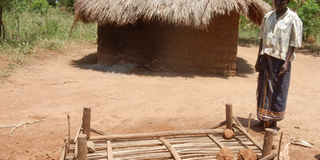Prime
Justice for children - When an 11-year-old died in jail

Opio's mother stands by the grave in which he was laid. Photos by Bill Oketch.
What you need to know:
Moses Okello, (not real name) 14, and his brother were also detained the same day, but shortly before Opio and his co-accused were brought to the police post. Their case was different. They had been throwing stones at a dog and accidentally hit a man as he rode a bicycle nearby. He immediately took them to the police post where they were detained, but only after they were severely beaten
“If I had strength, I would have killed the man who killed my son.” These were the words of a heartbroken mother, still reeling from the shock and pain of the tragic death of her 11 year-old son, Solomon Opio.
Ms Josephine Ayo is a woman who has not had it easy in life. At the age of 40, the fine lines on her forehead and her stretched skin make her look ten years or so older.
On April 5th, 2017, her son, the seventh of eight children, died in a police cell at Adeknino police post, in Adeknino Sub County in Dokolo District where he and another child of the same age were detained. The two had been accused of stealing Jolly jus – an artificially flavoured drink packed in sachets and popular with primary school children.

Okello narrates the events of the fateful day.
The shop owner and another man reportedly kicked him several times before sending him to the police post.
On a hot Friday, exactly one week after he was buried, I visited their home in Alwar village about one kilometre from the police post.
A mound of red earth rested about two feet from his grave. His small bed was placed on the grave, with four boulders on each corner.
“We feared that pigs would come in at night and dig it up that’s why we covered it with his bed and added the big stones for support,” Ms Ayo explained.
The gloom and sadness in the family hangs heavily in the air.
Alwar is a quiet and seemingly peaceful village but like many rural settings of Uganda, the weak and poorly made grass thatched huts in this village bear the mark of a community heavily weighed down by the shackles of poverty.
Agriculture is the main source of livelihood in this village, albeit done on a small scale and primarily for subsistence.
The last time Ms Ayo saw her son was Monday April 3, 2017 as he washed his feet to get to school.
“I left him home as I headed for the garden. I was told he came back home at around 4pm, but I had gone to visit his aunt.”

The police post where Opio died.
At around 8pm, on her way back home, she was told that her son had been arrested for stealing from a shop.
Moses Okello, (not real name) 14, and his brother were also detained the same day, but shortly before Opio and his co-accused were brought to the police post. Their case was different. They had been throwing stones at a dog and accidentally hit a man as he rode a bicycle nearby. He immediately took them to the police post where they were detained, but only after they were severely beaten.
Shortly after, Opio was brought to the police post.
“They held him like a wheelbarrow. His legs were held back midair and he was crawling with both hands,” Okello recalls.
The beatings were incessant and never stopped. Night came and they all went to sleep but Opio got more restless. He wanted to use the latrine but was not allowed to go out.
“The OC told him to use the basin in the cell and told him to empty it in the morning. He then decided that he would answer the call of nature the following morning,” He adds.
When the boys woke up the next morning, Opio was dead.
“They asked me to lift his leg but it was stiff and he had gone cold. His right eye was wide open but he was not blinking, and I told myself that a living person would not look like he did. His lower lip was also open but still I was not sure whether he was dead or alive,” he explains.
James Otto, the councilor representing Adeknino Sub County to the district of Dokolo says the police blundered with the case.
“Police messed up with the case first of all by locking up four children and an adult in the same cell,” he told Daily Monitor, adding that he has raised the matter with the District Police Commander for action to be taken.
According to Sylvia Namubiru, the Executive Director Legal Aid Service Providers Network, where minors commit simple offences such as petty theft or assault, the best way of handling is through local council courts, and the child and family protection unit of police.
“For the simple cases such as petty theft, the child and family protection unit of police must take charge,” she says.
However, she says the police must also be involved and the child’s parents should be present when the complaint is being raised.
According to Irene Adibaa, the superintendent of police at the Family and Child Protection Unit, there are institutional challenges mainly as a result of financial constraints that in some cases force children to be locked up with adults.
However, she says any inhumane treatment of a child is illegal.
“Children are not supposed to be beaten or treated in a violent way, those are personal mistakes for individual officers, but no one has the right to beat children. Once those police officers are reported, we have the professional standards unit that will handle them because it is unprofessional conduct,” she said.



